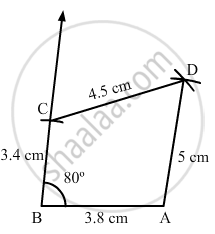Advertisements
Advertisements
Question
Construct a quadrilateral ABCD in which AB = 3.8 cm, BC = 3.4 cm, CD = 4.5 cm, AD = 5 cm and ∠B= 80°.
Solution
Steps of construction:
Step I: Draw AB = 3 . 8 cm .
\[\text { Step II: Construct} \angle ABC = 80^\circ . \]
Step III : With B as the centre and radius 3 . 4 cm, cut off BC = 3 . 4 cm .
Step IV: With C as the centre and radius 4 . 5 cm, draw an arc .
Step V : With A as the centre and radius 5 . 3 cm, draw an arc to intersect the arc drawn in Step IV at D .
Step VI: Join AD, BC and CD to obtained the required quadrilateral .

APPEARS IN
RELATED QUESTIONS
Construct the following quadrilaterals.
Quadrilateral MORE
MO = 6 cm
OR = 4.5 cm
∠M = 60°
∠O = 105°
∠R = 105°
Construct the following quadrilaterals.
Rectangle OKAY
OK = 7 cm
KA = 5 cm
Construct a quadrilateral ABCD in which AB = BC = 6 cm, AD = DC = 4.5 cm and ∠B = 120°.
Construct a quadrilateral PQRS, in which PQ = 3.5 cm, QR = 2.5 cm, RS = 4.1 cm, ∠Q = 75° and ∠R = 120°.
Construct a quadrilateral ABCD given BC = 6.6 cm, CD = 4.4 cm, AD = 5.6 cm and ∠D = 100° and ∠C= 95°.
Construct a quadrilateral ABCD, in which AD = 3.5 cm, AB = 4.4 cm, BC = 4.7 cm, ∠A = 125° and ∠B= 120°.
Construct a quadrilateral ABCD given that AB = 4 cm, BC = 3 cm, ∠A = 75°, ∠B = 80° and ∠C = 120°.
In a parallelogram PQRS, if ∠P = 60°, then other three angles are ______.
______ measurements can determine a quadrilateral uniquely.
Is it possible to construct a quadrilateral ROAM in which RO = 4 cm, OA = 5 cm, ∠O = 120°, ∠R = 105° and ∠A = 135°? If not, why?
